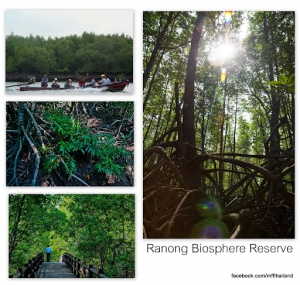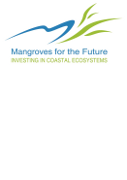Regional Training Course on Mangrove Restoration and Management
Location: Cha-am, Phetchaburi, Thailand. 13th Aug 2013 to 21st Aug 2013
Since 2008, the Mangroves for the Future (MFF) initiative, through its small and large grant facilities has supported mangrove planting and restoration activities in the MFF member countries. These activities have supplemented a large repository of other information and data on mangrove restoration built up over the last two to three decades, and especially following the 2004 Indian Ocean Tsunami.
Among the numerous mangrove projects that have been supported, some have contributed significantly to improving coastal ecosystems and associated livelihoods. Yet, there are also many projects with disappointing results, and too many have simply planted mangrove seedlings without giving adequate attention to the wider ecosystem and socio-economic impacts of mangrove planting. Overall, because of the very ‘project’ nature of these activities, there has been very little critical evaluation of the consequences of these projects, or compiling of the lessons that can be learned.
It became clear that mangrove restoration activities need to be examined from the stand point of their societal values, and how they can contribute to improving the health of coastal ecosystems and conserving biodiversity within the context of integrated coastal area management. In order to address these concerns, MFF's Regional Steering Committee decided that a Regional Colloquium should be held to share best practices on mangrove restoration and critically review the lessons learned.
The Colloquium was held on 30-31 August 2012 at the Radisson Blu Resort Temple Bay, Mamallapuram near Chennai, India. The main objectives of the colloquium were to:
- Examine the various experiences from the countries where mangrove projects have been carried out;
- Enable countries to critically examine the merits and demerits of these mangrove projects; and
- Share experiences so that countries can replicate the good practices.
The Colloquium also recognized that, despite the wealth of scientific knowledge, technical expertise and good practices available to support mangrove restoration/rehabilitation and monitoring, they are not being applied widely or well enough to offset the continued degradation of mangroves in most countries. Resulting from the sharing of experiences from mangrove restoration/rehabilitation projects, plus critical examination of the current status of mangrove ecosystems in the nine participating countries, A Call for Action was prepared, which has been presented at various fora, including the COP-11 of Convention on Biological Diversity (CBD) in Hyderabad, India, in October, 2012. This Call for Action was also considered at the 9th Regional Steering Committee of MFF in November, 2012.
While endorsing the MFF Call for Action, RSC-9 decided that the Secretariat should take the lead to conduct a field-based mangrove restoration training course in collaboration with the Sirindhorn International Environmental Park, Thailand and prepare innovative Guidelines on Mangrove Restoration (going beyond only technical considerations, to include effective methods to involve local communities in planning, implementation, and monitoring of mangrove restoration, and as beneficiaries of the enhanced ecosystem services created).
In this light, the MFF Secretariat together with the Sirindhorn International Environmental Park, Thailand and other partners, is pleased to announce the Regional Training Course on Mangrove Restoration and Management, scheduled from 13-21 August, 2013. The training course programme will be posted soon.
Participants: The event is by invitation only to MFF Member countries and MFF Outreach Countries (Cambodia and Myanmar). The Training Course is designed for practitioners who are directly involved in mangrove management in their home countries. Ideally, there shall be equitable representation from Government and Civil Society. The participants will be expected to provide, before the training course, a short paper outlining the mangrove restoration experiences from their respective countries and the actions proposed by the countries to take forward the recommendations in the Call for Action.
MFF will bear travel and accommodation related costs for this training.
Faculty: The training course will be conducted by a faculty consisting of both international and Thai resource persons. The facilities at the Sirindhorn International Environmental Park and the Ranong Biosphere Reserve will be used for the training course.
MFF Secretariat
08 July 2013

Ranong Biosphere Reserve, Ranong, Thailand © MFF Thailand, 2012
Share this page
Related Documents

Regional Training Course on Mangrove Restoration and Management
Course Programme
Author: MFF
Publisher: MFF
Posted on: 1st Aug 2013
Category:
Size: 36 KB